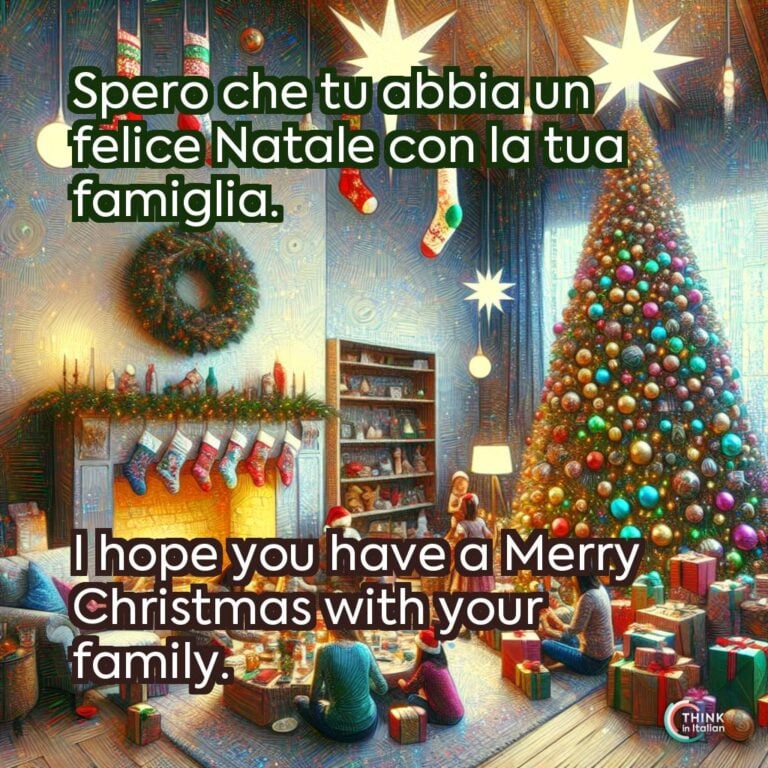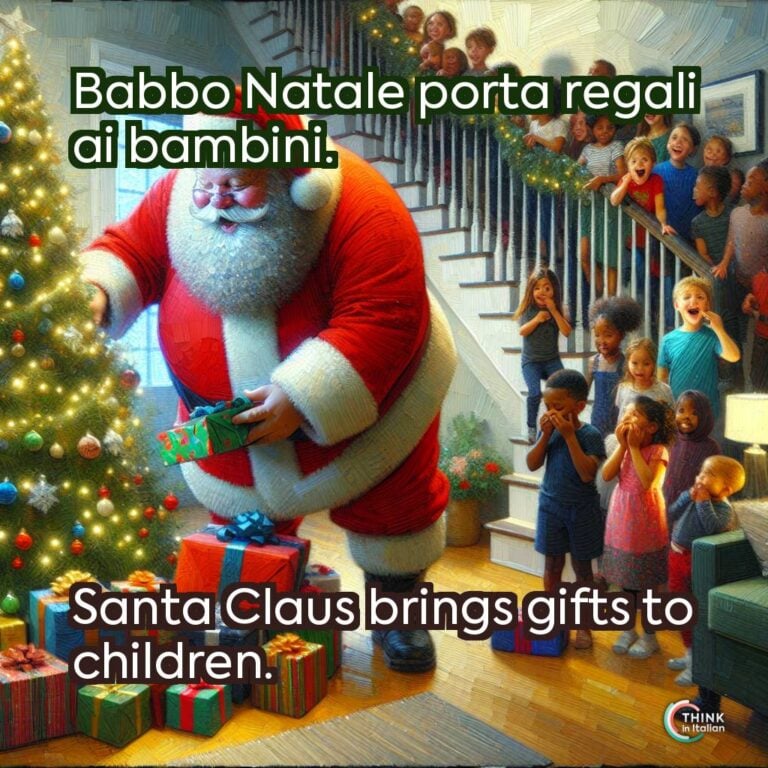“Merry Christmas” in Italian
The most direct way to say “Merry Christmas” in Italian is Buon Natale. This phrase is used universally across Italy and fits any context, whether formal or casual.
However, Natale (Christmas) in Italy is a vibrant blend of traditions that spans from December 24th (la Vigilia di Natale) to January 6th (l’Epifania). When I think of Christmas, I think of the entire holiday season.
Here, I will guide you through essential phrases to greet friends and family. This way, if you’re looking to extend Christmas greetings to the overall period, you’ll have the right words to do so.
How to say “Merry Christmas” in Italian
General Holiday Greetings
To encompass the entire holiday season, including New Year’s, Italians use broader greetings such as:
Tanti auguri di buone feste!
Best wishes for the holidays!
Buone feste natalizie!
Happy Christmas holidays!
These phrases are ideal for wishing someone joy and peace throughout all holiday festivities, from Christmas to Epiphany.
Personalized Holiday Wishes
Adding a personal touch to your holiday greetings can make them more meaningful. Here are some warm, expressive phrases:
Ti auguro un Natale pieno di gioia e amore.
I wish you a Christmas full of joy and love.
Pace e serenità a te e alla tua famiglia!
Peace and serenity to you and your family!
Che la magia del Natale ti accompagni per tutto il nuovo anno.
May the magic of Christmas be with you throughout the new year.
Un caloroso augurio di un sereno Natale e un prospero Anno Nuovo!
A warm wish for a peaceful Christmas and a prosperous New Year!
Auguri di un sereno e felice Natale!
Wishing you a peaceful and happy Christmas!
These expressions emphasize the importance of togetherness, joy, and familial bonds, core values of Italian Christmas celebrations.
Combining Christmas and New Year Greetings
When wishing someone both a Merry Christmas and a Happy New Year, use:
Buon Natale e Felice Anno Nuovo!
Merry Christmas and Happy New Year!
This expression is especially popular in end-of-year cards and messages.
Responding to Christmas Greetings
When someone wishes you Buon Natale, simply replying with grazie (thank you) may come off as impolite. Instead, add:
Grazie, e altrettanto!
Thank you, same to you!
Grazie, anche a te!
Thanks, you too! (informal)
Grazie, anche a Lei!
Thanks, you too! (formal Lei)
Grazie, anche a voi!
Thanks, you too! (plural)
These responses show that you appreciate the holiday spirit and wish the same for the sender.
The Italian Christmas
Christmas-Related Words
- Natale (Christmas)
- Vigilia di Natale (Christmas Eve)
- Santo Stefano (December 26th, a public holiday)
- Capodanno (New Year’s Eve)
- Epifania (Epiphany, celebrated on January 6th)
- Presepe (Nativity scene)
- Babbo Natale (Santa Claus)
Italian Traditions
- Il Presepe: originating in 1223 with St. Francis of Assisi, i presepi are detailed depictions of the birth of Jesus and are seen in homes and squares, especially in Naples, the epicenter of this art form.
- La Befana: on January 6th, Epiphany marks the visit of La Befana, a folkloric witch who brings gifts to children. This tradition blends religious stories with folklore and is cherished nationwide.
- Gathering Meals: on Christmas Eve, Italians host il cenone (the big dinner), a seafood-based rich meal. Instead, pranzo di Natale (Christmas’ lunch) is typically marked by tortellini in brodo – my favorite dish ever – roasted meats, and sweet treats like panettone and pandoro.
- Gift-giving: in Italy, this tradition holds special significance and typically takes place during la Vigilia or on Christmas morning. We typically bring a small present, like wine or chocolates, when visiting someone’s home, a gesture that embodies the Italian spirit of hospitality and appreciation.






